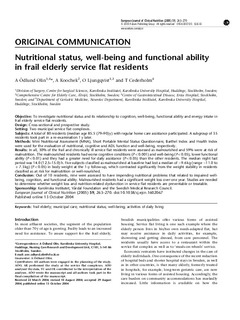| dc.contributor.author | Olin, A. Ödlund | |
| dc.contributor.author | Koochek, A. | |
| dc.contributor.author | Ljungqvist, O. | |
| dc.contributor.author | Cederholm, Tommy | |
| dc.date.accessioned | 2018-03-23T08:57:31Z | |
| dc.date.available | 2018-03-23T08:57:31Z | |
| dc.date.issued | 2005 | |
| dc.identifier.citation | Ödlund, A.O., Koochek, A., Ljungqvist, O., & Cederholm, T. (2005). Nutritional status, well-being and functional ability in frail ederly service flat residents. European Journal of Clinical Nutrition, 59(2), 263-270. | nb_NO |
| dc.identifier.uri | http://hdl.handle.net/11250/2491825 | |
| dc.description.abstract | Objective: To investigate nutritional status and its relationship to cognition, well-being, functional ability and energy intake in frail elderly service flat residents.
Design: Cross-sectional and prospective study.
Setting: Two municipal service flat complexes.
Subjects: A total of 80 residents (median age 85.5 (79-90) y) with regular home care assistance participated. A subgroup of 35 residents took part in a re-examination 1 y later.
Methods: Mini Nutritional Assessment (MNA), Short Portable Mental Status Questionnaire, Barthel Index and Health Index were used for the evaluation of nutritional, cognitive and ADL function and well-being, respectively.
Results: In all, 30% of the frail and chronically ill service flat residents were assessed as malnourished and 59% were at risk of malnutrition. The malnourished residents had worse cognitive conditions (P<0.001) and well-being (P<0.05), lower functional ability (P<0.01) and they had a greater need for daily assistance (P<0.05) than the other residents. The median night fast period was 14.0 (12.5-15.0) h. Five subjects classified as malnourished at baseline had lost a median of -9.6 kg (range -11.0 to +7.3 kg) (P<0.05) in body weight at the 1-y follow-up, which contrasted significantly from the weight stability in residents classified as at risk for malnutrition or well-nourished.
Conclusion: Out of 10 residents, nine were assessed to have impending nutritional problems that related to impaired well-being, cognition, and functional ability. Malnourished residents had a significant weight loss over one year. Studies are needed to determine whether weight loss and nutrition-related dysfunction in service flat residents are preventable or treatable. | nb_NO |
| dc.publisher | European Journal of Clinical Nutrition | nb_NO |
| dc.subject | frail elderly | nb_NO |
| dc.subject | municipal care | nb_NO |
| dc.subject | nutritional status | nb_NO |
| dc.subject | well-being | nb_NO |
| dc.subject | Activities of daily living (ADL) | nb_NO |
| dc.subject | ernæring | nb_NO |
| dc.subject | pasientsikkerhet | nb_NO |
| dc.title | Nutritional status, well-being and functional ability in frail ederly service flat residents | nb_NO |
| dc.type | Journal article | nb_NO |
| dc.source.pagenumber | 263-270 | nb_NO |
| dc.source.volume | 59 | nb_NO |
| dc.source.journal | European Journal of Clinical Nutrition | nb_NO |
| dc.source.issue | 2 | nb_NO |
| dc.identifier.doi | 10.1038/sj.ejcn.1602067 | |
